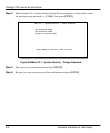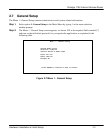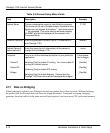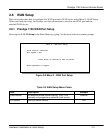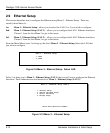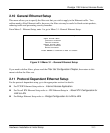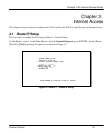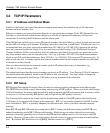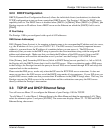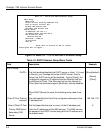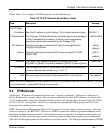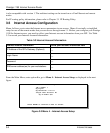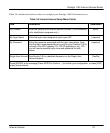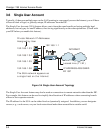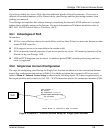
Prestige 1100 Internet Access Router
3-2 Internet Access
3.2 TCP/IP Parameters
3.2.1 IP Address and Subnet Mask
Similar to the houses on a street that share a common street name, the machines on a LAN share one
common network number, also.
Where you obtain your network number depends on your particular situation. If the ISP (Internet Service
Provider) or your network administrator assigns you a block of registered IP addresses, follow their
instructions in selecting the IP addresses and the subnet mask.
If the ISP did not explicitly give you an IP network number, then most likely you have a single user account
and the ISP will assign you a dynamic IP address when the connection is established. If this is the case, it is
recommended that you select a network number from 192.168.0.0 to 192.168.255.0 (ignoring the trailing
zero) and you must enable the Single User Account feature of the Prestige 1100. The Internet Assigned
Number Authority (IANA) reserved this block of addresses specifically for private use; please do not use
any other number unless you are told otherwise. Let’s say you select 192.168.1.0 as the network number;
which covers 254 individual addresses, from 192.168.1.1 to 192.168.1.254 (zero and 255 are reserved). In
other words, the first 3 numbers specify the network number while the last number identifies an individual
workstation on that network.
Once you have decided on the network number, pick an IP address that is easy to remember, e.g.,
192.168.1.1, for your Prestige 1100.
The subnet mask specifies the network number portion of an IP address. Your Prestige 1100 will compute
the subnet mask automatically based on the IP address that you entered. You don’t need to change the
subnet mask computed by the Prestige 1100 unless you are instructed to do otherwise.
3.2.2 RIP Setup
RIP (Routing Information Protocol) allows a router to exchange routing information with other routers.
The [RIP Direction] field controls the sending and receiving of RIP packets. When set to both, the Prestige
1100 will broadcast its routing table periodically and incorporate the RIP information that it receives; when
set to none, it will not send any RIP packets and will ignore any RIP packets received.
The [Version] field controls the format and the broadcasting method of the RIP packets that the Prestige
1100 sends (it recognizes both formats when receiving). RIP-1 is universally supported; but RIP-2 carries
more information. RIP-1 is probably adequate for most networks, unless you have a unusual network
topology.
Both RIP-2B and RIP-2M sends the routing data in RIP-2 format; the difference being that RIP-2B uses
subnet broadcasting while RIP-2M uses multicasting. Multicasting can reduce the load on non-router
machines since they generally do not listen to the RIP multicast address and so will not receive the RIP
packets. However, if one router uses multicasting, then all routers on your network must use multicasting,
also. By default, RIP direction is set to [Both] and the version set to [RIP-1].



